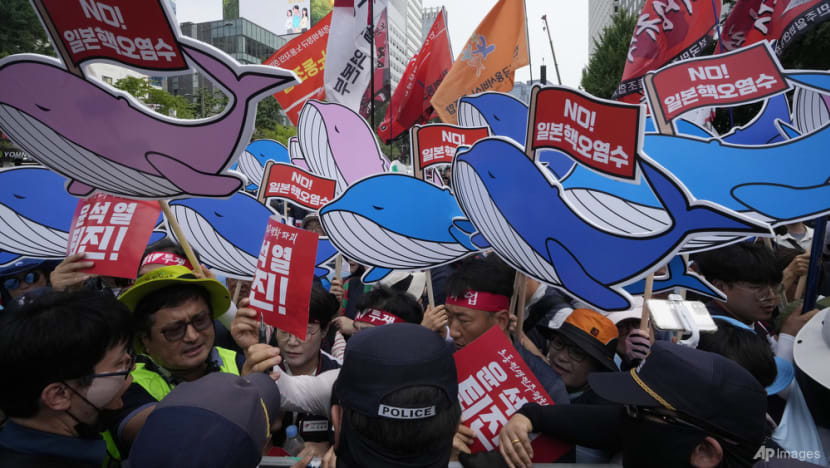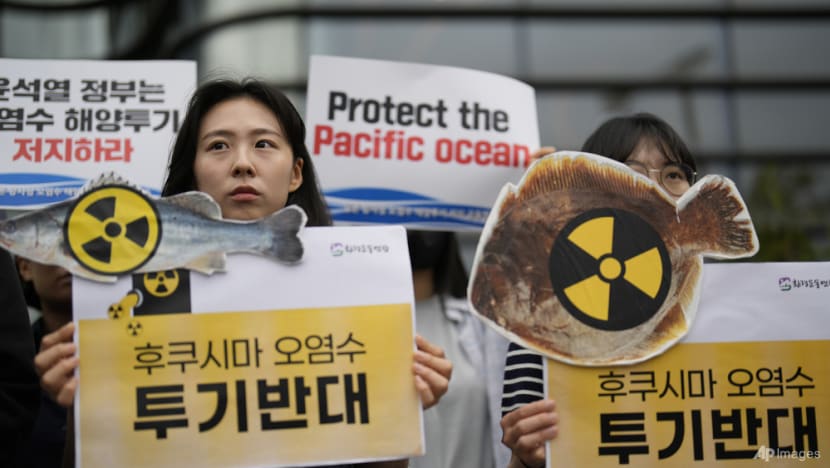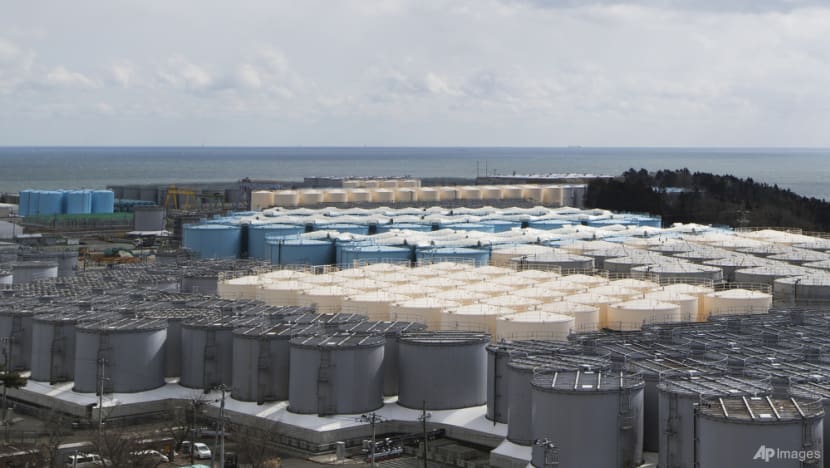South Korean opposition steps up pressure on government to condemn Japan’s Fukushima water release
On Thursday, lawmakers from the main opposition Democratic Party started an overnight sit-in inside the National Assembly to protest the IAEA report and the Fukushima wastewater release.

Members of South Korean Confederation of Trade Unions struggle with police officers during a rally against the government's labor policy and Japanese government's decision to release treated radioactive water from Fukushima nuclear power plant, in Seoul, South Korea, Thursday, July 6, 2023. The head of the U.N. atomic agency toured Japan's tsunami-wrecked Fukushima nuclear power plant on Wednesday and said he is satisfied with still-contentious plans to release treated radioactive wastewater into the Pacific Ocean. The red sign reads "No ! Treated radioactive water of Japan." (AP Photo/Ahn Young-joon)
SEOUL: South Korean opposition lawmakers have been stepping up pressure on the government to condemn Japan's plan to discharge treated radioactive water from the tsunami-wrecked Fukushima power plant into the sea.
The government said on Friday (Jul 7) it respected the conclusions of a safety review by the United Nations’ nuclear watchdog, which approved Japan’s plan to release the wastewater.
Seoul confirmed that the concentration of radioactive material “meets standards” for ocean discharge, adding that the release of the treated water is expected to “not have any meaningful impact on our ocean areas”.
It announced its own assessment after the International Atomic Energy Agency (IAEA) on Tuesday said a two-year review showed that the plans were consistent with global safety standards and would have a “negligible radiological impact to people and the environment”.
PROTESTING AGAINST FUKUSHIMA WASTEWATER DISCHARGE
On Thursday, lawmakers from the main opposition Democratic Party started an overnight sit-in inside the National Assembly to protest the IAEA report and the Fukushima wastewater release.
They also asked for a meeting with the IAEA director-general Rafael Rossi, who will be in South Korea on Friday following his four-day visit to Tokyo.
Democratic Party lawmaker Wi Seong-gon said: “Many experts believe that the release of contaminated water into the ocean is unprecedented and will have a devastating impact on the health and lives of current and future generations.”

Several of the Fukushima Daiichi plant's reactors went into meltdown after cooling systems were overwhelmed by a tsunami in 2011.
The Japanese government maintains that it has treated the water - enough to fill 500 Olympic-sized swimming pools - that was used to cool the fuel rods of the nuclear power plant after it was damaged.
The wastewater has been filtered to remove most radioactive elements except for tritium, an isotope of hydrogen that is difficult to separate from water.
The water storage tanks at the Fukushima site are estimated to be full as early as next year, and space for building more is scarce.
Plant operator Tokyo Electric Power Company (TEPCO) had said that it would discharge the water into the sea over the course of 30 to 40 years.
After the IAEA’s endorsement, Japan’s Prime Minister Fumio Kishida said his country would now aim to gain acceptance for its plan both domestically and internationally.
The plan to discharge the treated radioactive water comes as Seoul and Tokyo are trying to improve bilateral ties hurt by historical disputes.

SEAFOOD VENDORS FEEL HELPLESS
Meanwhile, many vendors at Noryangjin fish market, the largest fisheries market in Seoul, told CNA that they feel helpless, even as the debate over Japan’s plan to release treated radioactive water into the ocean rages on.
“What can we do?” said one vendor. “We don’t have the power to stop it, and so I just hope the discharge will have a very limited impact.”
Many South Korean consumers are worried that the country's sea products could be contaminated by wastewater released into the sea by Japan.
“Of course I am worried about the safety of (the products) before and after the release,” said a resident.
“Because this is related to what I consume, and since I have children, I am worried.”
Mr Park Gil-sung, an official at the Noryangjin fish market, said they have been conducting radiation level tests on Japanese sea products for some time.
“We have been regularly conducting tests since 2014. We carried them out every Monday, Wednesday, and Friday,” he added.
“But with people becoming more worried, we have increased that to five times a day, Monday to Friday. Since our fish market is carrying out these tests regularly, we hope customers will come and visit without worrying.”


















